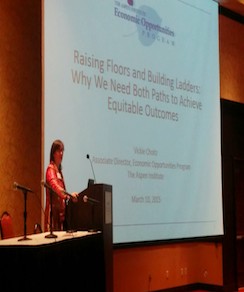On Tuesday March 10, 2015, the Office of Community College Research and Leadership (OCCRL) and Pathways Resource Center (PTR) held its annual Scaling Up Pathways to Results Conference.
Vickie Choitz, Associate Director of the Economic Opportunities Program at the Aspen Institute opened with her keynote address entitled: Raising Floors and Building Ladders: Why We Need Both Paths to Achieve Equitable Outcomes. Highlighting the need for both educational opportunities and career pathways, Choitz reminded the audience of the need for livable wages in generating opportunities out of poverty, stating, “we may succeed in getting students through career pathways, but what is waiting for them on the other side […] people can’t climb ladders on shaky floors.” Her talk, while specifically focusing on labor market prospects for low-income students, reflected not only the promotion of equitable educational and occupational outcomes in programs of study, but also PTR’s commitment to advancing equity through its research, partnerships, and professional development opportunities.
Following Choitz’s address, a number of interactive workshops were available to conference participants. In discussing program implementation and pathways, a plurality focused on the significance of partnerships, leaderships, civic engagement, inclusiveness, and game changing strategies. One Million Degrees: Empowering Community College Students to Succeed in School, in Work, and in Life, in particular, facilitated by Jessica Besser-Rosenberg and Dr. Lorenzo Baber, Assistant Professor of TalkEducation Policy, Organization and Leadership at the University of Illinois, Urbana-Champaign, illustrated the importance of cultural competence in serving the needs of low-income students of color. OMD (One Million Degrees) empowers and supports low-income college students to succeed in school, work and life.
The OMD model recognizes that not all low-income students have the same experiences and therefore tailors services to meet students’ unique needs based on cultural, family, and personal differences. Dr. Baber stated that while serving an urban neighborhood in Chicago, OMD noted that many of the students were not making use of the tutoring services provided. Moving away from a deficit framework, OMD realized that the students’ lack of participation was not due to lack of agency but to the lack of daycare, as many are parents. OMD responded to this need by building new partnerships with childcare providers so that students can maximize all OMD services. Such efforts reinforce the importance of partnerships, cross-cultural understanding, and holistic approaches, and the need to broaden opportunities by providing students with the tools necessary for them to fulfill their potential.
As the conference proceeded into the day, the energy and mission continued. During lunch, Dr. Rich Halverson, Professor of Education Policy and Curriculum Instruction at the University of Wisconsin-Madison, encouraged conference attendees to re-think pathway (pipeline) strategies. In a digital era, it is important to customize learning strategies for students around 21st-century tools such as Facebook, YouTube tutorials, and other social and technological outlets. Dr. Halverson argued that this change is critical if educators want to keep up with not only the current trends of the era, but also engage students in all learning capacities. As the day ended and the conference came to a finale, one point was clear, the student’s needs were always placed first in constructing, evaluating, and implementing pathways to success.
Jacqueline Rodriguez is a graduate research assistant for the Pathways to Results project at the Office of Community College Research and Leadership. Ms. Rodriguez is a PhD student in Education Policy, Organization and Leadership at the University of Illinois at Urbana-Champaign. Her research interests include investigating the educational and economic mobility prospects for Black and Latino youth.
